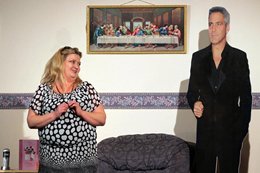From the opening of the production, there is a definite sense that this is a narrative in the form of Shirley Valentine, but from a West Belfast perspective. As the audience find their seats, they are greeted by tunes from Cyndi Lauper and Dolly Parton. It’s evident that this play is either about a night on the tiles with the girls, or a girly night in with a vodka and coke. It turns out to be the latter. As Bridie Murphy (Donna O’Connor) returns from a night out carrying a recently-stolen cardboard cut-out of George Clooney, it is clear that she has a story that she wants to tell George. She comically narrates various incidents in her life, from meeting her rioting husband, Seamus, to working in an Accident and Emergency department. With a very dead-pan sense of humour, particular to Northern Ireland, she presents the audience with a humorous account of a life during and after the Troubles.
Although fictional, Bridie’s story offers a perspective of history that is often forgotten or ignored by the history books. This is a tale of a West Belfast woman who had to act as “both mother and father” to her son when, shortly after their marriage, her husband was imprisoned for IRA activity. Not only that, but it also documents her attempts years later to renegotiate her relationship with Seamus when he is released from prison under the terms of the Good Friday Agreement.
The set is simple and uncluttered as Bridie takes her seat in an armchair centre stage, with only a painting of 'The Last Supper', a First Holy Communion photo and a clock hanging on the wall behind her. As she addresses the cardboard cut-out she tells George that they have a lot in common, that she too worked in a hospital, but that it was nothing like in ER as there was no sex in the linen cupboard and that, in fact, you were lucky to find linen in the linen cupboard.
From start to finish, the monologue - written by Brenda Murphy and Donna O’Connor - is made up of witty and often hilarious one-liners. Although the conflict in Northern Ireland is more than simply a backdrop to her story, there is no opportunity for the seriousness of the Troubles to enter her narrative. Under Tony Devlin’s direction, O’Connor is great as the 48-year old Bridie, bringing huge amounts of energy to the role and delivering each line with gusto. The text is riddled with stereotypes and nothing is sacred: Men, women, the English, the Irish, gays and straights are all ridiculed in some way for comic effect.
 However, as the play progresses, such are the amount of one-liners, it is as if O’Connor is performing at a stand-up comedy gig rather than delivering a monologue, and at times, the boundaries between O’Connor and her character become blurred. At one point Bridie tells her story about a night in a gay bar and re-enacts her karaoke singing of ‘I Will Survive’. She then encourages the audience to join in, which they do, and for a moment it feels like the production has become a pantomime. As Bridie continues to recount her tale she is cheered on by the audience, as if she is a real person. Also, while her story may progress chronologically, there is no central narrative thread through the monologue. In essence, the motivation to return after the interval is not due to a desire to find out what happens to Bridie, but to hear some more witty gags.
However, as the play progresses, such are the amount of one-liners, it is as if O’Connor is performing at a stand-up comedy gig rather than delivering a monologue, and at times, the boundaries between O’Connor and her character become blurred. At one point Bridie tells her story about a night in a gay bar and re-enacts her karaoke singing of ‘I Will Survive’. She then encourages the audience to join in, which they do, and for a moment it feels like the production has become a pantomime. As Bridie continues to recount her tale she is cheered on by the audience, as if she is a real person. Also, while her story may progress chronologically, there is no central narrative thread through the monologue. In essence, the motivation to return after the interval is not due to a desire to find out what happens to Bridie, but to hear some more witty gags.
Brassneck Theatre Company has created a production that is extremely entertaining, as revealed by the standing ovation that it received. The use of local place names and local slang suggest that it may appeal to Northern Irish audiences in particular, but Bridie’s story also has something for everyone. Filled with stereotypes and simplifications of the history of Northern Ireland, the play is by no means an in-depth analysis of the Troubles – nor does it try to be. But for those looking for some light-hearted fun and a few laughs, this is the play to see.
Pádraic Whyte is a Visiting Research Fellow at the Institute of Irish Studies, Queen’s University Belfast.